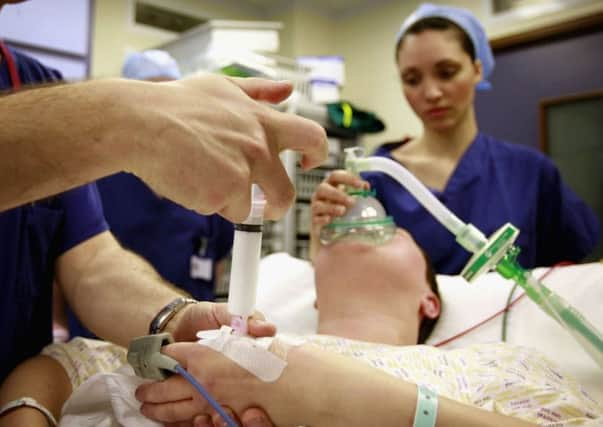Glasgow region ‘has lowest kidney donation rates’


Researchers from Cambridge University found that the Glasgow region, which covers patients from hospitals across the west of Scotland, had the lowest percentage of kidney donors at 3.2 per cent of those people who died in critical care.
But the figures were disputed by Scottish experts, who said donation rates had increased substantially since the period covered by the study, published in the British Journal of Anaesthesia.
Advertisement
Hide AdAdvertisement
Hide AdIt is hoped the findings will help to target efforts to increase donor numbers, such as trying to boost consent rates from potential donors’ relatives.
Across the UK around 6,000 patients currently need a kidney transplant, and last year 373 died on the waiting list.
Two-thirds of transplanted kidneys come from deceased donors who die in critical care, with the remainder coming from living donors of close family members who need a transplant.
The latest study focused on 27,482 patients who died in critical care between April 2010 and December 2011.
Out of these patients 1,528 (5.5 per cent) went on to become kidney donors, with a patient receiving their kidney.
The researchers then went on to assess differences in donation rates across the UK, where 284 hospitals are grouped into 20 kidney donation zones.
These zones are named after the city where the transplant centre is based.
The Glasgow zone, which covers patients from hospitals in the city as well as elsewhere across the west of Scotland, had the lowest overall kidney donation rate at 3.2 per cent.
Advertisement
Hide AdAdvertisement
Hide AdManchester was also highlighted for having a low donation rate at 4.5 per cent.
At the over end of the spectrum, the Cardiff zone had a donation rate of 7.5 per cent and in Cambridge it stood at 7 per cent.
Scotland’s other kidney donation zone in Edinburgh has a rate of around 6.5 per cent.
The rates were adjusted to take into account factors which affect organ donation, such as death rates, cause of death and the types of critical care available in the area.
The researchers said this allowed them to make “accurate and meaningful” comparisons of kidney donor rates across the UK.
Researcher Dominic Summers, from Cambridge University’s department of surgery, said: “We did not expect to find such marked differences in organ donation rates between different regions in the UK after already taking into account the various factors known to influence the number of organ donors.
“Our findings indicate that despite huge progress in organ donation rates over the last five years, there is considerable scope to increase these rates further and improve more lives through kidney transplantation.”
Mr Summers said the reasons for the low donation rates in Glasgow were not known.
Advertisement
Hide AdAdvertisement
Hide AdBut he said those working in transplant services were focussing on areas such as increasing consent rates so loved-ones agree to donations taking place more often.
Compared to other countries, consent rates are relatively low in the UK, the researcher added.
“For example, the UK’s national consent rate in 2009 was around 59.7 per cent, compared to Spain where it is 83.6 per cent, Poland where it is 88.8 per cent and Lithuania where it is 69.6 per cent and so on,” Mr Summers said.
“There are lots of countries who have markedly quite higher consent rates.”
Dr Stephen Cole, regional clinical lead for organ donation in Scotland, questioned the findings of low donation rates in the west of the country.
“This is historical data which doesn’t really reflect the situation as it is now and my view is that they have selectively interpreted certain aspects of the data to produce the results they have,” he said.
“As of today there have been 110 deceased organ donors in Scotland this year which is an 100 per cent increase from the figure of 2008.
“There is tremendous engagement from intensive care units from around the country so that organ donation is an end of life choice for patients.”
Advertisement
Hide AdAdvertisement
Hide AdDr Cole added: “I would want to reassure people that in Scotland we are identifying, referring and speaking to families on a daily basis who are coming to terms with losing their loved one and organ donation is a routine choice that is offered to these patients and their families.”
Paul Murphy, national clinical lead for organ donation at NHS Blood and Transplant, said: “Every potential donor is precious and can save lives, but if they are not identified and referred then they, and their family, are denied the opportunity to be an organ donor and to transform the lives of others after their death.”